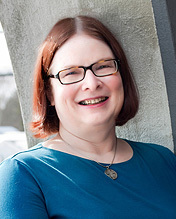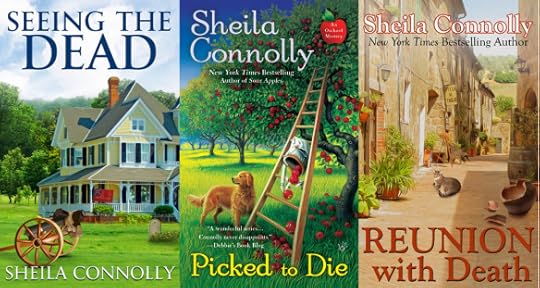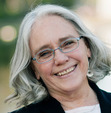Edith Maxwell's Blog, page 275
October 9, 2014
A Wicked Welcome to Hank Phillippi Ryan
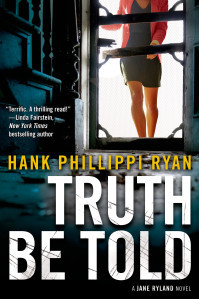 The Wickeds all know Hank Phillippi Ryan. She is a Sister in Crime, a friend, and a cheerleader. We had a great conversation, with the second half of the interview appearing over at Pen, Ink, and Crimes, the Sisters in Crime New England blog.
The Wickeds all know Hank Phillippi Ryan. She is a Sister in Crime, a friend, and a cheerleader. We had a great conversation, with the second half of the interview appearing over at Pen, Ink, and Crimes, the Sisters in Crime New England blog.
I want to talk about your books, especially Truth Be Told, the new Jane Ryland novel, but first I’d love to ask you a little bit about you. You had/have a huge career as a television reporter. Tell us a little bit about that.
Oh yes, I am still investigative reporter for Boston’s NBC affiliate. I’ve been a television reporter since… 1975! And so far have 32 Emmys for investigative reporting. Longevity does have its pluses.
I think it was on my mother’s influence, because when I was growing up she would never tell me the answer to anything. “Go and find out,” she would always insist. “Go ask for yourself.” So I learned how to ask questions, and how to be confident in research. It always seemed like fun to me, solving a puzzle and having an adventure.
I never planned to be a reporter, though. I thought I would be a geneticist, or an English teacher, or the lawyer for the Mine Workers. Finally deciding I wanted to change the world, I went into politics, and worked in several political campaigns. Sadly, no candidate I worked for actually won. Seemed like the universe was trying to tell me something!
Finally, with crossed fingers and a lot of nerve, I applied for a job as a radio reporter, This was 1971. I only got the job–and I know this is true–because I told them their license was up for renewal at the FCC and they did not have any women employees. Ta dah. The next day I had my first job in broadcasting. I took a chance—and found my first calling.
So I’m really proud to be part of breaking the gender barrier in broadcasting!
And if you ask me what the best story I’ve ever done is, I would say… It’s still to come.
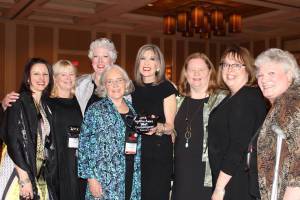
At 2013 Malice Domestic, celebrating Hank’s win for Best Contemporary Novel. From L-R Liz, Kate Flora, Julie, Edith, Hank, Barb, Sherry, and Mo Walsh
I’m glad to hear that! What made you start writing mysteries?
Oh, I always wanted to be a mystery author, ever since I was a little girl. Tess Gerritsen always says writers “self-select” at about age 7, and I sure did. I was all about Nancy Drew, and Sherlock Holmes, and even back then, Agatha Christie.
I loved the idea of being able to create a puzzle, that someone could then solve. But that the result would be surprising.
What was surprising… It wasn’t until maybe 40 years later that I actually had a good idea for a plot!
The moment I thought of it, secret messages in computer spam!, I got goosebumps, and I still do now. And from that moment I was obsessed with writing. I told my husband… I’m going to do this! No contract, no agent, and absolutely no idea of how publishing worked. But I was obsessed.
That turned out to be Prime Time, which won the Agatha for best first mystery.
And ever since then, writing mysteries has been at the top of my mind! I think about it all the time.
The newest, TRUTH BE TOLD, is a big exciting entertaining thriller, set in Boston–about a diabolical mortgage fraud scheme and a notorious cold case murder. And also about a reporter who fabricates stories.
It got starred reviews from Booklist and from Library Journal, which has the best review line I’ve ever seen: “Drop everything and binge-read until the mind-boggling conclusion!” Got to love that.
 The buzz on this book is great. I wonder, how has Hank influenced Jane Ryland?
The buzz on this book is great. I wonder, how has Hank influenced Jane Ryland?
That’s a wonderful question. The reason all of our books are special, and unique, is that only we could write them, correct? And I know Jane Ryland could not exist without me.
But Jane is, what, 30 years younger than I am? So what she’s going through now are cycles of life that I have already handled. And problems and decisions I have already faced, both personal and professional.
Still, she is not me! She is a new person, and that is part of the joy. It’s really amazing as she reveals herself to me… Her confidence and her fears and her vulnerability and her history and her goals.
She doesn’t always make the same decisions I would. And that surprise is also part of the fun.
Jane is much more confident than I was at 34, I can tell you that! But she is 34 at a different time in our culture than I was, see what I mean? (I’ll be 65 next week! Yeesh!)
Happy early birthday!! What can Jane do that you wish you could do?
Well, as an objective reporter, I am not supposed to have any opinions. And I certainly can’t comment on the state of journalism these days. Jane can.
And does.
I love that. Your first series featured Charlotte McNally, and was a more of a traditional mystery, with some cozy influences. Tell us a little about writing that series.
The Charlie series, which I think of as a mystery series, is a little bit more humorous – I guess, a lot more humorous than the Jane Ryland thrillers. They are in first person, only from Charlie’s point of view. So there’s a lot more internal dialogue. And that makes a huge difference in telling the story.
The Jane books are multiple point of view, past tense, third person. There’s Jane, and Detective Jake Brogan, and three others in each book!
I started doing writing that way because I knew the story of The Other Woman woman was so much “bigger” than a Charlotte McNally story could be .
And in the Jane books, including the new Truth Be Told, the tone is darker, and the events are more pervasively sinister. It has more of a big city feel, even though both series are set in Boston.
In a big thriller, the story can be so much more complex then it can be in a first-person traditional mystery. I still don’t write graphic sex or violence (though I certainly read books that include it!) It’s much more interesting to me as a writer to create anticipation and aftermath and imagination.
(More about Charlie in the next year or so!)
Can’t wait for the Charlie news! Last question, what do you wish your readers knew about you?
I’m so grateful for everything–but you knew that. And I’m so excited and nervous about Truth Be Told–but you knew that. And I am crossing fingers that you love it–but you knew that, too.
Thank you for visiting with the Wicked Cozys Hank! Readers, Hank will do a giveaway today to whet your appetite for Truth Be Told— one copy of The Other Woman and one of Agatha-winning The Wrong Girl.
About Truth Be Told:
TRUTH BE TOLD begins with an all-too-familiar tragedy in today’s headlines: a middle-class family evicted from their home in the suburbs of Boston. In digging up the facts on this heartbreaking story—and on other foreclosures—reporter Jane Ryland soon learns the truth behind a big-bucks scheme and the surprising players who will stop at nothing, including murder, to keep their goal a secret.
Boston police detective Jake Brogan may have a liar on his hands. A man has confessed to the Lilac Sunday killing, a long-unsolved murder that haunted Brogan’s police-commissioner grandfather. While Jake’s colleagues take the confessor at his word, Jake is not so sure.
In the meantime, Ryland and Brogan’s paths are once-again intertwined—and as their private relationship heats up, it may mean difficulties in their professional lives.
Financial manipulation, the terror of foreclosures, the power of numbers, the primal need for home and family and love… What happens when everything you believe is true turns out to be a lie?
HANK PHILLIPPI RYAN is the on-air investigative reporter for Boston’s NBC affiliate. She’s won 32 EMMYs, 12 Edward R. Murrow awards and dozens of other honors for her ground-breaking journalism. A bestselling author of seven mystery novels, Ryan has won multiple prestigious awards for her crime fiction: three Agathas, the Anthony, Daphne, Macavity, and for THE OTHER WOMAN, the coveted Mary Higgins Clark Award. National reviews have called her a “master at crafting suspenseful mysteries” and “a superb and gifted storyteller.” Her 2013 novel, THE WRONG GIRL, has the extraordinary honor of winning the Agatha Award for Best Contemporary Novel and the Daphne Award for Mainstream Mystery/Suspense, and is a seven-week Boston Globe bestseller. Her newest hardcover, TRUTH BE TOLD, is a Library Journal Editor’s Pick and RT Book Reviews Top Pick, with starred reviews from Booklist and from Library Journal, which raves, “Drop everything and binge read!” She’s a founding teacher at Mystery Writers of America University and 2013 president of national Sisters in Crime.
Filed under: Interview Tagged: Jane Ryland, Truth Be Told

October 8, 2014
What We Love About the Orchard Mysteries
Sheila Connolly’s Orchard Mysteries are now on the eighth book, Picked to Die. All the Wickeds have been inspired by Sheila’s writing in one way or another. Here’s what we love about the Orchard series.
Edith: Since I also write a Massachusetts-based farm series, the Orchard series has a  special draw for me. I have worked casual references to Meg’s apples into a couple of my Local Foods mysteries, too. Farming in the northeast, whether it’s vegetables or tree fruit, involves the stress of weather, good and bad; the vagaries of customer whims; market trends beyond the farmer’s control; the joys of self-employment balanced off the despair of a failed crop; and so much more. But beyond farming, I’ve been inspired by Sheila’s intelligent protagonist and her clear portrayal of small-town Massachusetts. Keep ‘em coming!
special draw for me. I have worked casual references to Meg’s apples into a couple of my Local Foods mysteries, too. Farming in the northeast, whether it’s vegetables or tree fruit, involves the stress of weather, good and bad; the vagaries of customer whims; market trends beyond the farmer’s control; the joys of self-employment balanced off the despair of a failed crop; and so much more. But beyond farming, I’ve been inspired by Sheila’s intelligent protagonist and her clear portrayal of small-town Massachusetts. Keep ‘em coming!
Jessie: I love the feeling the series evokes of small-town New England. The characters and the setting reflect life here in a genuine way that I appreciate and admire. And, I just love your covers!
 Julie: Meg is such a great character. I love watching her find herself, and become more and more a part of the community. And the timing of this series is perfect. Apple season. Orchard series. Life is good.
Julie: Meg is such a great character. I love watching her find herself, and become more and more a part of the community. And the timing of this series is perfect. Apple season. Orchard series. Life is good.
Liz: I love reading the Orchard books in the fall! It’s just got the best fall-in-New-Englandy feel. Sheila’s writing is flawless, and the stories just pull me in. Her characters are fun and totally relatable. What’s not to love?
Barb: Like everyone else, I love the New England setting, but my very favorite thing is that the Orchard Mysteries are about grown-ups. Yes, they’re certainly cozies, but Meg and Seth are adults with adult challenges and preoccupations. Character, and the great writing, are what keep me coming back to this series.
Sherry: My husband recently startled me by saying he reads books for plot. I argued that he wouldn’t read a series if he didn’t like the characters. Sheila, in all her series, writes interesting characters with intriguing plots and a great setting. The Orchard Mysteries hold a special appeal because they make me think of my grandparents amazing orchard in Missouri.
Filed under: Wicked Wednesday Tagged: Orchard Mysteries, Picked to Die, sheila connolly

October 7, 2014
Wicked Happy Book Birthday Sheila Connolly!
It feels like we have book birthdays for Sheila three times a year. Oh, wait–we do! Today is the birthday of Picked to Die the eighth book in Sheila’s flagship Orchard Mystery series. Let’s see what it’s about.
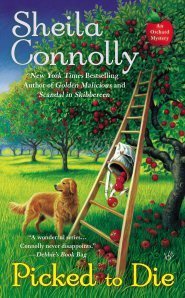 A TREE IS KNOWN BY ITS FRUIT
A TREE IS KNOWN BY ITS FRUIT
It’s harvest time in Granford, Massachusetts, and orchard owner Meg Corey and her fiancé, Seth, are both racing to beat the New England winter. Meg is bringing in her apple crop with a team of workers, while Seth is working to restore an old building in the center of town. But when his project is set back due to the unexpected discovery of a skeleton under the building—and even worse, a young man related to one of Meg’s former apple pickers is found dead behind the local feed store—the couple’s carefully laid plans are quickly spoiled…
Meg can’t help but wonder: are they just unlucky, or is there something rotten in Granford? If so, she knows she’s got to seek out the bad apple before it ruins the whole bunch…
Barb: Happy Book Birthday, Sheila! Hard to believe this is the eighth Orchard Mystery. I’ve been around so long, I remember when you announced the deal at a Sisters in Crime New England meeting. Does it ever get old?
Edith: I remember that meeting, too! It was my 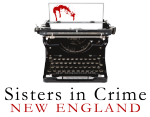 first SINC NE meeting, at Kate Flora’s house. So many congrats on your continued success. I love all three of your series, but I think I like the orchard series the best, so I can’t wait to read Picked to Die.
first SINC NE meeting, at Kate Flora’s house. So many congrats on your continued success. I love all three of your series, but I think I like the orchard series the best, so I can’t wait to read Picked to Die.
Sherry: I’m so happy for you, Sheila! I don’t know how you manage three series and your romantic suspense but as a reader I’m grateful you do!
Jessie: Sheila, you are an inspiration to us all! Thanks for showing us it can be done!
 Julie: Barb and Edith, I remember that meeting too! Sheila, happy book birthday!! I love the Orchard series, and can’t wait to read this one. I may need to go apple picking this weekend to celebrate–and of course, get some apple cider doughnuts.
Julie: Barb and Edith, I remember that meeting too! Sheila, happy book birthday!! I love the Orchard series, and can’t wait to read this one. I may need to go apple picking this weekend to celebrate–and of course, get some apple cider doughnuts.
Liz: Sheila, so happy for you. You’re truly an inspiration. I love this series, and can’t wait to get to this book. Wishing you many more series and much success!
Readers: Which of Sheila’s books have you read? (Or, why haven’t you?) Any questions for this NYT-bestselling, award-winning, super-productive, and extraordinarily nice (and generous) author?
Filed under: Book Release Tagged: Berkely Prime Crime, kate flora, Orchard Mysteries, Picked to Die, sheila connolly, Sisters in Crime New England

October 6, 2014
Stuff
by Sheila Connolly
For the past decade or more, I’ve harbored the fantasy of buying a cottage in Ireland. At first I was fixated on buying the site where my Connolly family originated, but I was discouraged by several things: (1) I had no job at the time, so no money, (2) the place was falling down since it hadn’t been lived in for half a century, (3) the farmer who lived next door used the space behind the house for his very large manure pile, and (4) there was a rather aromatic piggery up the hill. All excellent reasons not to buy that property!

Not the family home, but the way I wish it looked.
But the dream persisted through the years, and through a lot of changes in my life. So I have to ask myself why the idea still appeals to me, and I didn’t come up with one simple answer, but multiple ones:
–family ties, obviously—although none of my family lives in that part of West Cork now
–owning a place that is uniquely mine (without my husband’s name on the mortgage or title)
–the romance of the idea—most Americans I mention it to seem to love it, and wondered when they could come visit
–the Irish people I’ve talked to about the idea say it’s a good time to buy since the market has bottomed out
–the area is pretty and peaceful and quiet and you can see the Milky Way at night, and I can imagine getting good work done there as long as I had a wi-fi connection
–and finally, it would be like starting over—minus all my stuff.
I have a lot of stuff. I’ve written about it before, and I’m horrified that not much has changed. I haven’t undergone some miraculous transformation and purged my house (too big for two people!) of non-essential items. Although we did rent a dumpster and dispose of over THREE TONS of accumulated construction debris, plus odds and ends that prior owners had left behind (but not that Civil War cannonball I found under the house, a relic from a previous owner who was a Civil War veteran).
Why do I haul this issue out again? Well, in August I spent ten days in a rented apartment in Ireland, which I’d booked sight unseen. It was built over a garage, and it might have measured 15×40 feet all in (two rooms plus bath). I will say that it was very nicely fitted out, and had all the necessary amenities, and it was scrupulously clean, and even had free wi-fi. It became home very quickly during the short time I was there, but it was really suitable for only one person (which was fine since I was traveling alone). Add one more body and you’d be tripping over each other all the time.

My tiny kitchen (that’s the oven, not the microwave!)
With limited space you start thinking about what you really need. The kitchen-end of one room there drove that home most clearly. There was a two-burner stove, an oven that might hold a casserole if you left the top off, a fridge about one foot deep, a microwave, and a dishwasher. I never even opened the dishwasher, but I did use everything else. I even cooked! But it made me think: how would I have done things differently in the same space? (Skipped the dishwasher for sure.)
Don’t get me wrong: I love my stuff. Some of it is inherited, and it comes with memories of my family members attached. Some of it I’ve bought myself, and I can tell you when and where and why for almost all of it. When I see an item or hold it, I remember. I understand why “souvenir” is such an important concept—the word means “memory” in French—and having that tangible thing takes you back to a place and time from your past.
But even so, there’s something appealing about starting fresh, with a blank slate. And no matter how much I love my assembled clutter, it’s unpeaceful.
Writing is sometimes like that, especially if you’re writing a series. The first book is that blank slate, and you can fill it with people and places and things however you choose. But then there’s a second and a third (and if you’re lucky, even more), and you start collecting baggage. If a character appears in one book, do they have to come back? (Assuming you haven’t killed them.) Are you stuck in one place or can you visit others? If they’re living in one place, they must have surrounded themselves with something—furniture, knickknacks, books. And don’t forget the pets—you can’t just make them disappear.
So by the time you’ve written a few books in a series, things are getting a little crowded. Just like in life. Stuff happens.
The eighth book in the Orchard Series, Picked to Die, comes out tomorrow. When I began the series, my heroine Meg went from a Boston apartment to living in a 1760 colonial house with a barn, and one of the first things she added was a pair of rescue goats. Talk about a change in lifestyles! Curiously, she really isn’t into acquiring more stuff. She hasn’t spent a lot of time worrying about furniture or new curtains. I have to keep reminding myself: I created her. Is she mirroring my own (buried) feelings about accumulating stuff, or am I letting her try out a more streamlined space for me?
As Henry David Thoreau said, “Simplicity, simplicity, simplicity!”
It’s been a busy few weeks on the book front:
Seeing the Dead, the sequel to last year’s Relatively Dead, came out on September 21st. Find it on Amazon and Barnes & Noble.
Picked to Die (Orchard Mystery #8) comes out tomorrow, October 7th. (Amazon, Barnes & Noble.)
Reunion with Death is part of a BookBub promotion through October 11th, and is priced at 99 cents. (Yes, on Amazon and Barnes & Noble.)
Filed under: Sheila's Posts Tagged: clutter, Henry David Thoreau, Ireland, sheila connolly, simplicity, souvenir

October 3, 2014
Opening Lines
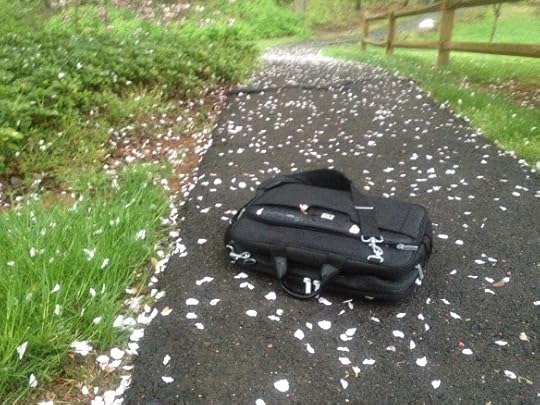 Edith: I TOLD him not to drop the damn laptop case. Those innocent little cherry blossoms were about to be blown right back to Tokyo.
Edith: I TOLD him not to drop the damn laptop case. Those innocent little cherry blossoms were about to be blown right back to Tokyo.
Jessie: Miles took one look at the beauty all around him and dropped everything to start a new life as a park ranger.
Barb: “I’ve told you officer. He walks our daughter to kindergarten every morning through the park. When the school called asking why she was absent, I rang his office. He never arrived. I ran out here and this is all I found.”
Julie: The Wicked Witch was out of ideas, until she saw the cherry blossoms dropping along the path. Dorothy would never guess that this was poppies 2.0. Serves her right. A lawyer? She goes back to Kansas to become a lawyer? Really? “I’ll get you, my pretty,” she said. “And your little Filofax too.”
Sherry: If he loved me as much as he loved the laptop, I might not have started tossing things out the window.
Filed under: Opening Lines Tagged: briefcase, Charlie Parker, cherry blossoms, Kansas, laptop, opening lines, Tokyo, Wicked Witch

October 2, 2014
Wouldn’t It Be Deadly–An Interview with D.E. Ireland
by Barb, enjoying fall in the Berkshires this week
First order of business–St. Martin’s has agreed to give away a copy of Wouldn’t It Be Deadly to two lucky commenters below–so jump aboard!
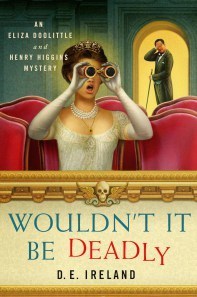 I’ve been excited about D. E. Ireland’s
Wouldn’t It Be Deadly
ever since I first heard the concept–Shaw’s Henry Higgins and Eliza Doolittle as sleuths. Who hasn’t wondered what happened after the curtain went down?
I’ve been excited about D. E. Ireland’s
Wouldn’t It Be Deadly
ever since I first heard the concept–Shaw’s Henry Higgins and Eliza Doolittle as sleuths. Who hasn’t wondered what happened after the curtain went down?
D.E. turns out to be the writing team of Meg Mims and Sharon Pisacreta. I first met Meg at Malice Domestic in 2013. Wouldn’t It Be Deadly was complete and they were seeking representation. Meg asked if she could contact my agent, John Talbot, and say I recommended him. I said, “Of course, just don’t say I’ve read your book and I loved it.” Which, to be clear, Meg would never, ever do, but I always say that because you never know.
It must have gone well, because it seemed like three weeks later, I got an e-mail from Meg saying that not only had John accepted the book, but he had sold the series! So I do feel, a teeny, tiny bit like one of the (many) fairy godmothers of Wouldn’t It Be Deadly.
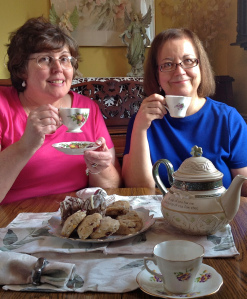 I’ve always been fascinated by writing teams, partly because I’ve never done it successfully. So when I had a chance to interview Meg and Sharon, that’s what we talked about.
I’ve always been fascinated by writing teams, partly because I’ve never done it successfully. So when I had a chance to interview Meg and Sharon, that’s what we talked about.
Barb: You’re writing the Eliza Doolittle and Henry Higgins Mysteries as a team. How did this come about? How do you know each other? Have you written together before?
Sharon: We met in college as anthropology undergraduates; my specialty was archaeology and history, Meg’s was linguistics. While I was already published in short fiction, it was only in the early 1990s that both of us began to write our own novels. Friends for nearly a decade by then, it seemed natural for Meg and I to became critique partners. This helped us to understand the other person’s strengths and weaknesses as a writer. The Eliza Doolittle/Henry Higgins series is our first attempt at writing together, although we had been looking for the right vehicle for a long time. And those years of critiquing each others’ manuscripts was an invaluable training ground for our eventual partnership as D.E Ireland. We knew each other’s writing style quite well, so there were few surprises when we finally began to work as a team.
Meg: Oh, there’s been some surprises along the way, but things have worked out very well. In the past, we acted as a sounding board for each others’ work, so now the brainstorming on a shared project is double the fun. We both had the same idea just the other day when I stumbled across some research! So while we “think alike” in some ways, we each have a different perspective on promotion, on villains, on what “too much detail” means, etc. Sharon can channel Higgins in ways I’d never dream of, and I’ve managed to channel Eliza – but we both take turns channeling each character. We have to know every character, from backstory to how they act and react.
Barb: So how does the writing work? Alternating chapters? One person outlines, the other writes? One does revisions? I’m dying to know. And did you find your rhythm of writing together right off the bat, or did it take awhile?
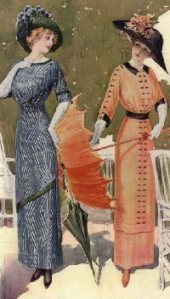 Sharon: A meticulously detailed outline is mandatory. As part of a writing duo, we have to literally be on the same page – or at least be aware of what the other partner is going to write about on that page. Both of us know exactly what is planned for each chapter and scene before we write the first sentence of the book. We discuss everything we want to do in the book, but I’m usually the one who actually writes up a monster of an outline – which makes Meg sigh in weariness. The outline changes often during the first draft as new ideas occur to us and original ideas start to look not so interesting. But changes are mutually agreed upon along the way. As for who writes what? Our initial plan was that we each write two consecutive chapters, alternating in this way for the whole manuscript. I tend to write faster than Meg, so sometimes we just agree among ourselves who is going to write a particular chapter. We may write alternating single chapters for the third book, so we’ll see how that works this time around.
Sharon: A meticulously detailed outline is mandatory. As part of a writing duo, we have to literally be on the same page – or at least be aware of what the other partner is going to write about on that page. Both of us know exactly what is planned for each chapter and scene before we write the first sentence of the book. We discuss everything we want to do in the book, but I’m usually the one who actually writes up a monster of an outline – which makes Meg sigh in weariness. The outline changes often during the first draft as new ideas occur to us and original ideas start to look not so interesting. But changes are mutually agreed upon along the way. As for who writes what? Our initial plan was that we each write two consecutive chapters, alternating in this way for the whole manuscript. I tend to write faster than Meg, so sometimes we just agree among ourselves who is going to write a particular chapter. We may write alternating single chapters for the third book, so we’ll see how that works this time around.
We’re also equally involved with revisions. When we have written our “assigned” first draft chapters, we exchange them and the other partner edits and revises them using Word’s Review/Track Changes option. But the other person does not see what changes have been made to those revised chapters until the first draft is finished. Meg and I have known each other since the early 1980s. We’ve been through a lot together. And it is that shared history and long friendship that keeps us from strangling each other when we do disagree on a passage or even a sentence in the manuscripts.
Meg: That outline is both incredible (I’m jealous, really) and terrifying. I’ve learned to write “to spec” so that’s been pretty cool, although characters might spin things in a new way. We write rough drafts differently – mine are literally rough, while Sharon polishes her roughs – but that’s something I’ve altered as well. I am slower, but when the Sicilian cracks the whip, I churn faster! Sharon writes overflow, while I write tight. But the end result makes a solid book.
Barb: What happens when there’s controversy? Disagreement over plot or character or series direction? How do you decide?
Sharon: Usually disagreement begins with email messages questioning what the other person is doing in a particular chapter or scene. I should explain that Meg lives three hours away from me, so our communication is often via phone and email. (This translates to daily phone calls and endless email messages.) Sometimes the emails become rather testy and even heated. After all, writers are passionate about their prose. But any tension between us has never lasted longer than several hours or at most overnight. We simply can’t afford to waste time arguing and have always been able to come up with a solution both of us can live with. Our attitude is that the quality of the book is all that matters, not our egos. Even more important, our long friendship is worth more than any book contract. I am sure Meg would agree when I say that we would walk away from D.E Ireland before we’d let the any writing conflicts threaten our friendship.
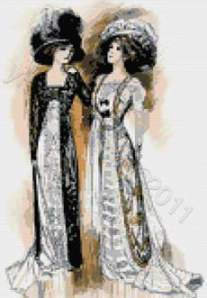 Meg: Sharon’s right, although… (just kidding!) The book’s quality takes precedence, and we’ve always compromised to that end. We both know how to bend – I came up with a research detail I couldn’t cut, and Sharon let it stay in because sometimes, some things are just too good. We’re both total research hounds, so we understand that. And we’re committed to take this series in exciting ways, since the premise is awesome. The more we learn about Eliza and Higgins, the more things have gone in directions we didn’t expect – especially in book 2. We can’t wait to write another.
Meg: Sharon’s right, although… (just kidding!) The book’s quality takes precedence, and we’ve always compromised to that end. We both know how to bend – I came up with a research detail I couldn’t cut, and Sharon let it stay in because sometimes, some things are just too good. We’re both total research hounds, so we understand that. And we’re committed to take this series in exciting ways, since the premise is awesome. The more we learn about Eliza and Higgins, the more things have gone in directions we didn’t expect – especially in book 2. We can’t wait to write another.
Barb: Not a team writing question, but I’ve seen lots of books about historical figures turned to sleuths, and of course treatments of famous sleuths like Sherlock over and over again, but I’ve never seen a book quite like yours. Where did the idea come from? What sort of obligation do you feel to Shaw and to your audience who may believe they know the characters well?
Sharon: Meg is the one who had the brilliant idea while driving over to see me one day, so I’ll let her tell it. As for our obligation to Shaw, it is huge. There would be no mystery series without his marvelous Eliza Doolittle and Henry Higgins. Everything we do in the series is based on his public domain play Pygmalion. This includes the favorite phrases of his characters and Shaw’s description of Higgins’s phonetics laboratory or his mother’s Chelsea flat. However Meg and I did take a few liberties regarding other characters in Pygmalion. For example, Shaw wrote that Freddy Eynsford Hill’s sister Clara becomes an owner of a furniture business. Where is the fun in that? So we have other plans for Clara that I believe would quite surprise Shaw. Otherwise we try to stay true to the spirit of the play. And we hope fans of Shaw’s Pygmalion and the musical My Fair Lady it inspired will feel they are revisiting beloved old friends and locales. Above all, we want to entertain the reader and hope they have a bit of fun watching Eliza and Higgins solve a murder or two.
Meg: ‘And oooooh, what a loverly feeling’ – when I was driving on the highway, singing along to the soundtrack, it hit me. Good golly, had any other writer thought of pairing Eliza with Higgins as amateur sleuths? Once I shared the idea with Sharon, we checked and voila! We had a new series. While it took us a year to write the first book of our ‘secret project’, things happened like lightning when our agent offered representation three hours after a one-paragraph email query. And he sold the series in three weeks.
Barb: What’s next writing-wise–both for D.E. Ireland and for you individually?
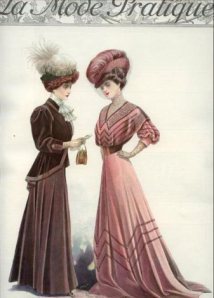 Sharon: Move Your Blooming Corpse, our second Eliza Doolittle/Henry Higgins book, was sent to our editor in early September. With a Sept. 23rd release date for Wouldn’t It Be Deadly, promotion (book signings, a book launch tea, blogging etc.) should take up most of our time until mid-October. After that we begin working on a detailed outline for Book Three. November is all about Bouchercon and editorial revisions for Blooming. But we will spend the long Michigan winter hammering out a first draft for the next book. I also currently have a proposal with my agent for a contemporary cozy mystery series set in a little village along the shores of Lake Michigan, which is also my current home.
Sharon: Move Your Blooming Corpse, our second Eliza Doolittle/Henry Higgins book, was sent to our editor in early September. With a Sept. 23rd release date for Wouldn’t It Be Deadly, promotion (book signings, a book launch tea, blogging etc.) should take up most of our time until mid-October. After that we begin working on a detailed outline for Book Three. November is all about Bouchercon and editorial revisions for Blooming. But we will spend the long Michigan winter hammering out a first draft for the next book. I also currently have a proposal with my agent for a contemporary cozy mystery series set in a little village along the shores of Lake Michigan, which is also my current home.
Meg: I can’t wait to see how Deadly does, both in reviews and sales. I’m really excited for Blooming as well – and I’m raring to go with more books in the series. But I’ve got several other projects to finish, including a Christmas novella with a dog that should be out before Bouchercon or shortly after, I hope! I’m working on a western mystery series, plus a contemporary cozy series as well. No rest for the weary! Being a full-time writer is fun, but it’s also hard work. It’s what I always dreamed of as a career, but I still read plenty and enjoy time with friends and family.
Barb: Readers- what do you think? Henry Higgins and Eliza Doolittle as sleuths. Leave a comment and win a book.
BUY LINKS:
Amazon
B&N
FOLLOW THE AUTHOR
www.deireland.com
www.deireland.com/blog
BIO
D.E. Ireland is a team of award-winning authors, Meg Mims and Sharon Pisacreta. Long time friends, they decided to collaborate on this unique series based on George Bernard Shaw’s wonderfully witty play, Pygmalion, and flesh out their own version of events post-Pygmalion.
Filed under: Guest posts Tagged: Eliza Doolittle, George Bernard Shaw, Henry Higgins, John Talbot, Meg Mims, Pygmalion, Sharon Pisacreta, team writing

October 1, 2014
Wicked Wednesday: What Do You Read When You’re Writing?
 The discussion is age-old. Some writers say they can’t read, or can’t read in their genre, when they’re writing. Others say, “If I had to give up reading in order to write, I’d give up writing.”
The discussion is age-old. Some writers say they can’t read, or can’t read in their genre, when they’re writing. Others say, “If I had to give up reading in order to write, I’d give up writing.”
Wickeds, do you read when you’re writing? If not, why not? If so, what do you read? Is your reading restrained in any way? Does it make a difference whether you’re writing a first draft or doing a polish? When do you read for research?
Inquiring minds want to know.
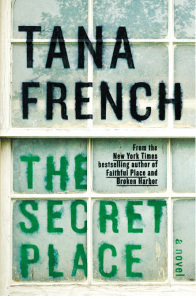 Liz: Love this topic! I find reading depends more on my overall mood than what I’m actually working on. Since most of what I read is mystery/crime, it varies between cozies, thrillers and other types of crime. That said, I don’t have nearly as much time to read as I would like…but that’s really the only limitation I have when it comes to reading. I can read any fiction, any time. I read for research as the need arises, or as the mood strikes. Sometimes I veer off into the world of business books, but I quickly return to my beloved mysteries.
Liz: Love this topic! I find reading depends more on my overall mood than what I’m actually working on. Since most of what I read is mystery/crime, it varies between cozies, thrillers and other types of crime. That said, I don’t have nearly as much time to read as I would like…but that’s really the only limitation I have when it comes to reading. I can read any fiction, any time. I read for research as the need arises, or as the mood strikes. Sometimes I veer off into the world of business books, but I quickly return to my beloved mysteries.
Right now, I’m catching up on my cozies – recent releases from my fellow Wickeds and a Natural Remedies Mystery I’m blurbing. Next up – the new Tana French book. Can’t wait!
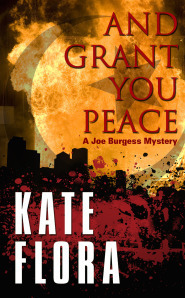 Edith: I find I have such little time for reading, if I didn’t read while I am writing, I’d never read. I certainly read for research both while I’m creating and while I’m polishing: Whittier’s biography, or the history of Brown County, Indiana, for example. But I also read cozy mysteries, New England-based police procedurals, suspense novels. They don’t seem to interfere with my writing or revision process, other than making me look more closely at my own work to make sure it’s as clear, lyrical, and deeply drawn as I can make it.
Edith: I find I have such little time for reading, if I didn’t read while I am writing, I’d never read. I certainly read for research both while I’m creating and while I’m polishing: Whittier’s biography, or the history of Brown County, Indiana, for example. But I also read cozy mysteries, New England-based police procedurals, suspense novels. They don’t seem to interfere with my writing or revision process, other than making me look more closely at my own work to make sure it’s as clear, lyrical, and deeply drawn as I can make it.
Right now, in final revisions on one book and starting revisions on another, I’m fittingly sitting in Maine reading Kate Flora’s new (Portland, Maine based) Joe Burgess mystery, And Grant You Peace.
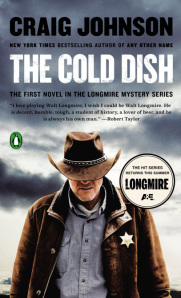 Julie: I try to read while I am writing. BUT I find that the ability to just read, and not dissect, is gone while I am writing. For example, I am reading the Longmire books in preparation for Crime Bake. Craig Johnson is the Guest of Honor, and I am going to interview him at lunch during the conference. First paragraph, my “oh he writes in first person. Wonder how this works in a long series…” kicks in. It is hard to turn the writer off.
Julie: I try to read while I am writing. BUT I find that the ability to just read, and not dissect, is gone while I am writing. For example, I am reading the Longmire books in preparation for Crime Bake. Craig Johnson is the Guest of Honor, and I am going to interview him at lunch during the conference. First paragraph, my “oh he writes in first person. Wonder how this works in a long series…” kicks in. It is hard to turn the writer off.
Edith: Agree with you on the dissection habit, Julie. It’s given me no patience for poorly written books. There isn’t enough time in the universe to read a book I see glaring writing errors in – point of view hops, too much telling not showing, and so on.
Jessie: I used to only read non-fiction when I was working on first drafts. I was really concerned about unintentionally matching the tone of what I was reading in my own work. As time has passed my confidence in my own voice has gotten stronger and I no longer worry about what I read. Like Edith, I read a lot of books for research and I do tend to read those voraciously whilst creating a first draft.
At any given time I am in the midst of several books. I get a little panicky if I don’t have at least a few books waiting in the wings. As a matter of fact, I bought a house next door to a public library partially influenced by that concern. Currently, I am part-way through a Swedish crime novel, a book about the relationship between Harry Houdini and Arthur Conan Doyle and a book on the history of the tarot.
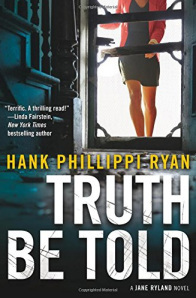 Barb: If I couldn’t read while I’m writing, it would be a close and agonizing call, but I would probably give up writing. Reading, after all, was my first love. Being a professional writer does crowd your reading time. There are books for research and books for blurbs. If you’re moderating a panel or conducting an interview at a conference, as Julie is, you’ve got a lot of books to read. Somehow or another it all piles up. But to be my best and happiest self, I have to read books I love, books that I wish I could have written. Kate Flora (I love the Joe Burgess novels, too) has a tradition where she allows herself to read anything she wants between Christmas and New Years. I’ve taken this tradition and expanded it (I’m a slow reader) to anything I want between the New England Crime Bake (Veteran’s Weekend) and New Years. It’s the ultimate luxury. Up this year will be Deborah Crombie, Louise Penny, Craig Johnson, Hank Phillippi Ryan, and (fittingly) Kate Flora.
Barb: If I couldn’t read while I’m writing, it would be a close and agonizing call, but I would probably give up writing. Reading, after all, was my first love. Being a professional writer does crowd your reading time. There are books for research and books for blurbs. If you’re moderating a panel or conducting an interview at a conference, as Julie is, you’ve got a lot of books to read. Somehow or another it all piles up. But to be my best and happiest self, I have to read books I love, books that I wish I could have written. Kate Flora (I love the Joe Burgess novels, too) has a tradition where she allows herself to read anything she wants between Christmas and New Years. I’ve taken this tradition and expanded it (I’m a slow reader) to anything I want between the New England Crime Bake (Veteran’s Weekend) and New Years. It’s the ultimate luxury. Up this year will be Deborah Crombie, Louise Penny, Craig Johnson, Hank Phillippi Ryan, and (fittingly) Kate Flora.
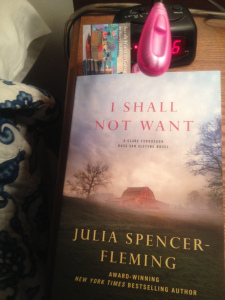 Sherry: Of course I read when I write. I read lots of thrillers and mysteries. The only thing I try to stay away from is any book that has a similar theme to mine. I agree with the other Wickeds that reading good books makes me a better writer and makes me work harder. Right after I read an early copy of Clammed Up I had the opportunity to write the proposal for the garage sale series. I loved Barb’s character Gus and I think he influenced my character, Angelo. The good news is when I told Barb, she was surprised and didn’t think I’d copied Gus. Angelo is quirky in his own way.
Sherry: Of course I read when I write. I read lots of thrillers and mysteries. The only thing I try to stay away from is any book that has a similar theme to mine. I agree with the other Wickeds that reading good books makes me a better writer and makes me work harder. Right after I read an early copy of Clammed Up I had the opportunity to write the proposal for the garage sale series. I loved Barb’s character Gus and I think he influenced my character, Angelo. The good news is when I told Barb, she was surprised and didn’t think I’d copied Gus. Angelo is quirky in his own way.
Readers: What’s your take? If you’re a writer, do you read while you’re writing? If you create other kinds of art, can you absorb art by others while you’re creating?
Filed under: Wicked Wednesday Tagged: And Grant You Peace, clammed up, Craig Johnson, deborah crombie, Gus, hank phillippi ryan, I Shall Not Want, Indiana, Joe Burgess Mysteries, John Greenleaf Whitter, julia spencer-fleming, kate flora, Longmire, louise penny, Natural Remedies Mysteries, New England Crime Bake, Sarah Winston Garage Sale Mystery, tana french, Truth Be Told

September 30, 2014
Guest: Michael Nethercott
Edith again, happily on a solo writing retreat in Maine
We welcome our fellow New England author Michael Nethercott today. His new 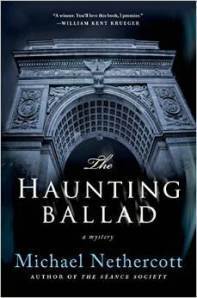 book, The Haunting Ballad (St. Martin’s Press), is the second whodunit in his traditional 1950s mystery series. It takes place in Greenwich Village and features the sleuthing odd couple from The Séance Society: private eye Lee Plunkett and scholarly Irishman Mr. O’Nelligan. Take it away, Michael!
book, The Haunting Ballad (St. Martin’s Press), is the second whodunit in his traditional 1950s mystery series. It takes place in Greenwich Village and features the sleuthing odd couple from The Séance Society: private eye Lee Plunkett and scholarly Irishman Mr. O’Nelligan. Take it away, Michael!
Cultural Currents
Blog entry: It’s the spring of 1957, and amidst the swirling music scene of New York’s Greenwich Village, a controversial songcatcher—a folk song collector—has died. Apparently, one late-winter’s night, she climbed to the roof of her apartment building and jumped over the edge. Jumped—or was she pushed?
That’s the kickoff of my new novel, The Haunting Ballad. In looking for a locale/theme for the latest entry in my mid-1950s series, I asked myself what cultural currents were in motion at that time. Well, one particularly lively one was the folk music movement that was just starting to skyrocket in ’57. In the urban centers such as New York and San Francisco, this movement overlapped with the rebellious Beat scene spearheaded by 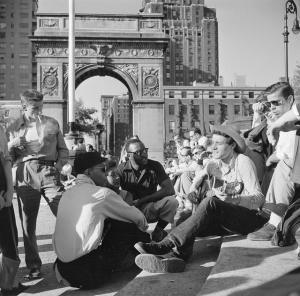 such scribes as Ginsburg and Kerouac. The Village, in particular, became an epicenter for all manner of colorful, dynamic, idiosyncratic goings-on. Seemed like a good place for mayhem.
such scribes as Ginsburg and Kerouac. The Village, in particular, became an epicenter for all manner of colorful, dynamic, idiosyncratic goings-on. Seemed like a good place for mayhem.
I found myself mentally flipping through the catalogue of musicians whose careers were thriving—or on the verge of taking off—in that time and place: Bob Dylan, Joan Baez, Odetta, the Clancy Brothers, and the various blues singers whose music was finding a new audience. This colorful crowd became an inspiration as I carved out my characters and plot threads. In my writing, I very much take my cue from the Golden Age mystery novelists—Agatha Christie, Rex Stout, Dorothy Sayers, etc.—and I take the “whodunit” piece seriously. I try to give the reader a large assortment of possible guilty parties. In this tale, the songcatcher’s demise leads Plunkett and O’Nelligan to a pretty varied jumble of suspects. There’s the bluesman with a checkered past, the eccentric coffee house owner, the moody Bohemian poetess, the boisterous clan of Irish balladeers, and a former Civil War drummer boy who has a hundred and five years under his belt.
Then there’s Mrs. Pattinshell, who labels herself a “ghost chanter”—meaning she sings songs that she claims the spirits of the dead have taught her. I grew up in a vast extended Irish family where presumably true ghost stories were bandied about like ping-pong balls. This definitely influenced me as an author. Something of the supernatural, the ghostly, always seems to find its way into my stories, and the present novel is no exception. Matter of fact, Mrs. Pattinshell’s spooky ditties are at the heart of the mystery. Hence the book’s title.
 When I first created my detectives, I opted for an unconventional spin on the standard buddy team. Young Lee Plunkett is a reluctant private eye who inherited the family business from his rough-and-tumble father. Somewhat deficient in both the rough and the tumble departments, Lee also has his limits as a deducer. That’s where Mr. O’Nelligan comes in. In the tradition of the gentleman sleuth, Mr. O’Nelligan lends his wit, wisdom and deductive chops to the inexperienced Lee. The well-read, quirky Irish immigrant can freely quote Celtic poets, Shakespeare or Elvis Presley. Also in the mix is Lee’s “perpetual fiancée” Audrey. In the course of the case, just to complicate things, Audrey is entranced by.one particular suspect—a handsome, slick young songwriter who has designs on her. This threat to Lee and Audrey’s relationship is at the core of [image error]the tale.
When I first created my detectives, I opted for an unconventional spin on the standard buddy team. Young Lee Plunkett is a reluctant private eye who inherited the family business from his rough-and-tumble father. Somewhat deficient in both the rough and the tumble departments, Lee also has his limits as a deducer. That’s where Mr. O’Nelligan comes in. In the tradition of the gentleman sleuth, Mr. O’Nelligan lends his wit, wisdom and deductive chops to the inexperienced Lee. The well-read, quirky Irish immigrant can freely quote Celtic poets, Shakespeare or Elvis Presley. Also in the mix is Lee’s “perpetual fiancée” Audrey. In the course of the case, just to complicate things, Audrey is entranced by.one particular suspect—a handsome, slick young songwriter who has designs on her. This threat to Lee and Audrey’s relationship is at the core of [image error]the tale.
Fortunately, I have an old friend who lives in the Village, whom I was able to stay with for a few days as I was doing my research. Though more than a half century has passed since the time of the folk music revival, I was able to walk those sidewalks and cobblestones and imagine what once was. I could almost catch the lost strains of acoustic guitars drifting down a corridor of phantom coffee houses. It sounded good…
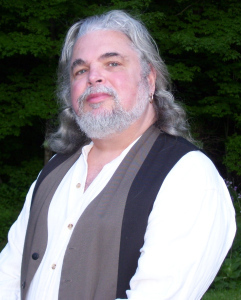 Readers: What are your favorite cultural currents from the past?
Readers: What are your favorite cultural currents from the past?
Michael Nethercott’s work has appeared in numerous magazines and anthologies including Alfred Hitchcock Mystery Magazine, Best Crime and Mystery Stories of the Year, and the Level Best anthologies. He is a Shamus Award finalist and a past winner of The Black Orchid Novella Award, The Vermont Playwrights Award, and Vermont Writer’s Award. Visit Michael Nethercott’s website and Facebook page.
Filed under: Guest posts Tagged: Greenwich Village, Michael nethercott, St Martin's Press, The Haunting Ballad

September 29, 2014
Welcome Leslie Budewitz!
Liz here, and today we have with us the lovely and talented Leslie Budewitz, author of the 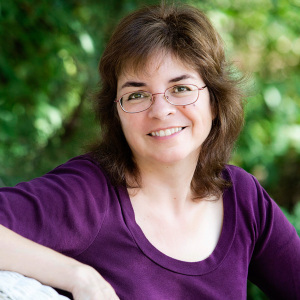 Agatha-award winning Food Lovers’ Village Mysteries and the brand new Spice Shop Mysteries. Leslie sat down to talk with me about her books, her characters and her favorite reads these days – and there’s even a shoutout to our own Barbara Ross!
Agatha-award winning Food Lovers’ Village Mysteries and the brand new Spice Shop Mysteries. Leslie sat down to talk with me about her books, her characters and her favorite reads these days – and there’s even a shoutout to our own Barbara Ross!
Your Food Lovers’ Village Mysteries take place in Jewel Bay, Montana, a fictional Bigfork. You’re always posting such beautiful pics of where you live on Facebook. Does your fictional town mirror a lot of your real world?
It really does. I live in a part of the country—NW Montana, on the road to Glacier National Park—justifiably known for its great natural beauty. But beyond the scenery and the outdoor recreation, this little village—like Jewel Bay—surprises people who don’t expect great art, food, theater, and increasingly, live music in a rural western community of less than five thousand. It’s those contrasts that make it such a great setting for a cozy mystery.
And of course, the characters. Boy, do we have characters!
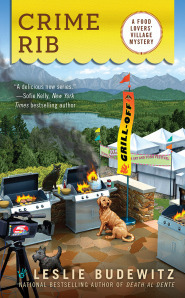 Tell us how Erin came to be. Is she like you at all? Did you have someone in mind when you wrote her?
Tell us how Erin came to be. Is she like you at all? Did you have someone in mind when you wrote her?
Erin Murphy is a lovely young woman, if I do say so myself. Like many characters, she came to life largely on her own: “black Irish,” with dark hair and eyes, but fair skin on a sweet, heart-shaped face. Not at all like her striking Italian-American mother Francesca, called Fresca. Like me, she grew up in Montana but left for several years, returning at 32. It’s a common story and one I wanted to explore through the eyes of a much younger woman. And like me, she’s devoted to her community and committed to supporting local business. We also share the experience of having a name that does not fully reflect one’s heritage, a subtle influence and a source of humor. And we both drive Subarus, but they’re so common around here, that’s no surprise!
Erin has business talents I can only envy. She manages her Spreadsheet of Suspicion with the ease of a cat pouncing on a mouse. Oh, there’s another similarity: We both inherited a sable Burmese cat from an elderly friend.
It’s great fun to write about a young woman making big decisions: to leave a career and return home to remake—and salvage—the family business, to choose a mate, how to deal with her loving but occasionally intrusive mother and sister.
The big difference: She’s courageous—and curious—enough to go after killers. Me, I’d call 911, lock the doors, and turn on all the lights!
I’m so interested in mother/daughter dynamics. Tell us about Erin and her mom, with whom she has a bit of conflict.
Fresca was widowed tragically when Erin was a senior in high school. She made the decision to shield her youngest child from her own pain—a decision with consequences fifteen years later, when Erin returns to Jewel Bay. Since her husband’s death, Fresca’s been running his family business, but she’s more passionate about pasta than retail, and recognizes that Erin has the skills and drive to make the struggling Merc succeed. Still, inviting an adult child to take over and actually giving her the reins are two different things. That conflict is the primary source of tension between the two.
At heart, they love, respect, and enjoy each other. I’ve been able to draw on observations of other families—especially those in business together—as well as my own. Of course, when you give a real-life experience to a fictional character, it changes—sometimes surprising even me!
Your recipes are amazing! How do you come up with them?
Thanks! I admit, I get a little carried away with the food! Each book involves a festival, so the recipes enable the reader to recreate some of the festival food at home. Other recipes describe dishes Erin eats at home, with her family, or in one of the village’s many restaurants. In both Death al Dente and Crime Rib, a recipe plays a role in solving the mystery.
Some come from my own collection; others I’ve found or created to fit the story. All have been thoroughly tested and carefully written so that both novice and experienced cooks can have as much fun with the food as Erin and I do.
What’s the best book you’ve read this year?
Ooh, tough question! The one downside of writing is that I don’t get to read as much as I used to, and sometimes can’t keep up with series I love. Two I can’t get enough of are Louise Penny’s Gamache novels and Alan Bradley’s Flavia DeLuce tales. I’m also dying to find out what happens next in Barbara Ross’s Maine Clam Bake mysteries!
What’s next in Jewel Bay?
After two books set in summer tourist season, it’s time for a good winter tale. Butter Off Dead (Berkley Prime Crime, July 2015) The merchants of Jewel Bay try to heat up chilly winter business with a new film festival. But their plans are sent reeling when a dangerous killer dims the lights on a local mover and shaker …
I’m also really excited about Assault and Pepper, first in my Spice Shop Mysteries, set in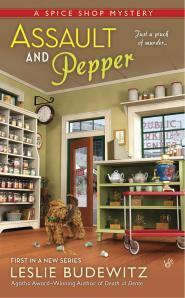 Seattle’s venerable Pike Place Market (Berkley Prime Crime, March 2015). Pepper Reece, owner of the Seattle Spice Shop, thinks she can handle any kind of salty customer—until a murderer ends up in the mix…
Seattle’s venerable Pike Place Market (Berkley Prime Crime, March 2015). Pepper Reece, owner of the Seattle Spice Shop, thinks she can handle any kind of salty customer—until a murderer ends up in the mix…
And of course, there will be tons of recipes—because I just can’t help myself!
Thanks for stopping by, Leslie! Readers, questions for Leslie? Leave them here and she’ll stop by to answer them!
Leslie Budewitz is the bestselling author of the Food Lovers’ Village Mysteries and the Seattle Spice Shop Mysteries. She is passionate about food, great mysteries, and her native Montana. Also a lawyer, Leslie won the 2011 Agatha Award for Best Nonfiction for Books, Crooks & Counselors: How to Write Accurately About Criminal Law & Courtroom Procedure, making her the first author to win Agatha Awards for both fiction and nonfiction.
Leslie loves to cook, eat, hike, travel, garden, and paint—not necessarily in that order. She lives in northwest Montana with her husband, a musician and doctor of natural medicine, and their Burmese cat, an avid bird watcher.
Visit her at http://www.LeslieBudewitz.com and on Facebook as Leslie Budewitz Author
Filed under: Guest posts Tagged: Agatha-award winning, Food Lovers' Village Mysteries, Leslie Budewitz, Spice Shop Mysteries

September 26, 2014
Ask the Editor — Jane Haertel
We are so happy to have our next guest editor, Jane Haertel, join us today. Read and learn!
 Name: Jane Haertel, Crazy Diamond Editing Services (www.crazydiamondediting.com)
Name: Jane Haertel, Crazy Diamond Editing Services (www.crazydiamondediting.com)
Area of Expertise: Romance of any shade, Young Adult, New Adult
How did you become an independent editor? A few years ago, a friend who was preparing to indie publish her YA novel asked me to proofread for her. My fussbudget nature would not allow me to leave it at a simple proofread, though, and I ended up copy and line editing the whole book for her, as well as providing content editing. Once I got started, I couldn’t stop, and I discovered that I had both a knack and a love for this part of the publishing process. After that, I picked up another client, who consistently began to hit the New York Times and USA Today lists of best-sellers, and through word of mouth I now have more than a dozen steady clients (several of whom hit the lists with every book).
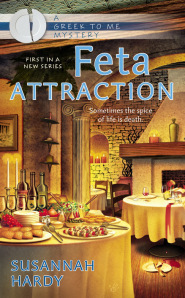 What are three things we should know about your area of expertise? Everyone—are you listening?—everyone needs an editor. (Yes, even me. Especially me.) When you’re all excited to indie publish something, and you’ve been over your manuscript a few times, it’s so tempting to think: Oh, in high school I was great at grammar and spelling, so I can save myself some coin by doing my own editing. Or: I’ve been writing for years. I’m not paying someone for something I can do myself. Wrong. You know what you meant to say, but that might not be what comes out on the page. And in general, your mom/sister/best friend is probably not the best person to do editing of any kind on your book. They love you, and they won’t want to hurt your feelings. Hire a professional. No matter your skill level, you need an objective, experienced set of eyes on your work.
What are three things we should know about your area of expertise? Everyone—are you listening?—everyone needs an editor. (Yes, even me. Especially me.) When you’re all excited to indie publish something, and you’ve been over your manuscript a few times, it’s so tempting to think: Oh, in high school I was great at grammar and spelling, so I can save myself some coin by doing my own editing. Or: I’ve been writing for years. I’m not paying someone for something I can do myself. Wrong. You know what you meant to say, but that might not be what comes out on the page. And in general, your mom/sister/best friend is probably not the best person to do editing of any kind on your book. They love you, and they won’t want to hurt your feelings. Hire a professional. No matter your skill level, you need an objective, experienced set of eyes on your work.
Editing is expensive. Sorry, but it’s true. It takes many, many, many hours to make just the first pass through a full-length manuscript, and this is how we editors make our livings. Especially for authors who are independently publishing their first works, there is a tendency to look for the lowest price and fastest turnaround. I wrote a book, darn it, and I want to start making my millions immediately. I can’t afford to hire an editor (or proofreader, professional cover artist, formatter). I would argue that you can’t afford not to assemble the best possible team to get your work out there. The market is glutted right now with indie books and getting good editing (and proofreading, and cover art, and formatting) is something you can control. If you want to make it in the indie world, you have to produce a product that is on a par with books published by New York houses. And yes, that costs money.
Still not convinced? Think about it this way. Writing and publishing books is a business. Would you expect to start, say, a knitting shop without providing any capital upfront for retail space, inventory, staffing? And, oh, open your doors to the public before all these things were in place? Of course not. That would be crazy, right? Putting your indie book out for sale is no different.
So get creative if you have to raise the money to hire professionals. If you have a special skill, perhaps you can barter services. I have edited in exchange for personal training, and for cookies. Which, now that I think about it, should probably be mutually exclusive. There’s probably stuff in your house that you can sell on eBay or Craigslist. Can you take on some freelance work of your own, such as cooking, sewing or knitting/crocheting for hire? Or take on a few hours of overtime at your day job? How about eating at home instead of going out to dinner? That’s the same as earning $50 or more, money that you can put toward your dreams. It’ll be worth the sacrifice upfront when the money from your beautifully professional book starts rolling in!
What do people usually get wrong? Good writing is not necessarily grammatically correct. In fact, perfect grammar makes fiction stilted and inaccessible to the reader. But there are some rules that should not be broken. Here are the mistakes I see most frequently:
Alright, alot. These are not words. Use all right and a lot.
Misuse of the apostrophe. This is perhaps my biggest pet peeve. Never, ever use an apostrophe to form the plural of anything. Example: Peach’s For Sale. Who is Peaches? What’s she selling? See what I mean? And the other most common assault on the poor apostrophe is the various formations of the word its. The only time that word should have an apostrophe is if you can replace it with it is or it has, never to show possession.
Adverbs. Okay, I’ll let you in on a little secret. I’m not one of those people who thinks that every –ly construction should be eradicated from a manuscript. Most, yes. But they don’t bother me as long as the author uses them … sparingly. And try not to end a sentence with an adverb like sparingly, LOL!
Misuse of the forms of the verb to lie. (Lay, lain, laid) The rules are too long to list, but here’s a link to a site that may help. http://www.quickanddirtytips.com/education/grammar/lay-versus-lie?page=all
Using dialogue tags other than said. Ninety-eight percent of the time, said is all you need. You want the reader focusing on your characters’ words, not getting distracted because you tried to get creative. “Hand me that glass of water,” he spouted/hissed/emitted/etc., etc. Once in a while, okay. But don’t make a habit of it.
And my personal pet peeve, the word smirk. Please, please, please. Unless your character is an annoying adolescent, or an adult acting like an annoying adolescent, do not have him/her smirking. A smirking character is automatically unlikeable. So, particularly in romance, but this holds true for other genres, do not let a main character perform this juvenile action.
Is there a great idea you’d love to share? Here’s a bit of my personal hoodoo. If you are stuck in the middle of a project, or you have finished a project and sent it off somewhere, perhaps to a potential agent or publishing house and you’re waiting on the outcome, go clean something that hasn’t been cleaned in a long time. Even better, get unwanted stuff out of your house—not just moved to another spot, but actually thrown away or donated. Still better, tackle something that you’ve been putting off or avoiding and that has been nagging at you. For example, if you hate going to the dentist, make—and keep—that appointment. Call an old friend you’ve been meaning to get back in touch with. The more things you do, the quicker and better the magic works.
 You see, making space in your head and your life allows new, wonderful things to come in. Nature abhors a vacuum. It works every time, but not always in the way you expect it. I did a lot of cleaning and decluttering while I was querying agents, and I not only got the call from an amazing agent, I got a three-book contract, all in a two-week span.
What are you working on? As an editor, I’m working on a juicy New Adult novel for a very good writer, so it hardly feels like a job, LOL!
You see, making space in your head and your life allows new, wonderful things to come in. Nature abhors a vacuum. It works every time, but not always in the way you expect it. I did a lot of cleaning and decluttering while I was querying agents, and I not only got the call from an amazing agent, I got a three-book contract, all in a two-week span.
What are you working on? As an editor, I’m working on a juicy New Adult novel for a very good writer, so it hardly feels like a job, LOL!
Readers: Jane will be available to answer your editing questions throughout the day.
Jane Haertel, who writes as Susannah Hardy, attended St. Lawrence University, graduating with a degree in history, and has worked as a waitress, handbag designer/manufacturer, paralegal, and currently as an editor of independently published short stories, novellas and novels at www.crazydiamondediting.com. She serves on the board of directors of the Connecticut Romance Writers of America and is a member of Sisters in Crime. Jane lives in Connecticut with her husband, teenaged son, and Elvira the Wonder Cat. You can connect with her alter ego, Susannah Hardy, at www.susannahhardy.com, on Twitter: @susannahhardy1, and on Facebook: https://www.facebook.com/pages/Susannah-Hardy/111056935644467 Her first novel, FETA ATTRACTION, releases January 6, 2015 from Berkley Prime Crime.
Filed under: Ask the Expert Tagged: Crazy Diamond Editing, editing, Feta Attraction, Greek to Me Mysteries, Jane Haertel, New Adult Novels, Susannah Hardy


